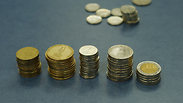
It’s a good time for American tourists to visit Israel – flights, especially those going through Ukraine or Moscow cost less than $500 round-trip. Once you get here, everything from falafel to T-shirts are cheap, thanks to an exchange rate of four shekels per dollar, up from 3.5 just a few months ago.
About 40 percent of Israel’s GDP comes from exports, meaning the depreciation of the shekel is good news for the Israeli economy. However, the flip side is that imports now cost more in Israel, which could have led to inflation. But the depreciation of the shekel comes as the price of oil has hit a new low, to under $50 a barrel.
“The reduction in the price of gasoline more than offset the effect of the shekel depreciation on consumer prices,” Avi Simhon, a former chief economic advisor at Israel’s Finance Ministry and currently a professor at Hebrew University. “The Bank of Israel would be very happy if the value of the shekel remains that low for a long period.”
However, the situation with the euro is completely different. The European Union (EU), which is Israel’s largest trading partner, is trying to deprecaite the value of the euro with respect to the dollar to boost the European economy.
While the overall picture of the Israeli economy is positive, the Israeli economy still faces some difficult issues. Two significant sectors of Israeli society – ultra-Orthodox men and Arab women – are significantly underrepresented in the Labor force. In addition, says Simchon, the standard of living in Israel is lower by 20 – 40 percent than in other developed economies like Western Europe.
Food prices are also much cheaper in Europe, which many Israelis discovered after an Israeli expatriate posted a receipt for “Milky”, a chocolate pudding dessert, which was cheaper in Berlin than in Tel Aviv even though it is produced in Israel. His Facebook post went viral, amid calls for more competition in dairy prices, which are controlled by two large companies in Israel.
Beyond that, Simhon says, the average productivity of an Israeli worker is about 30 percent lower than a European worker, mostly because of less investment in machines and capital per worker.
Israel also has a shortage of affordable housing, and housing prices have shot up, meaning many young couples can’t afford to buy an apartment. Various Finance Minister’s have promised to build affordable housing, but have not followed through. Many in Israel’s middle class say that the combination of high housing prices, a high tax burden, and compulsory military service into their 40’s combine to make it impossible for them to make ends meet.
Article written by Linda Gradstein.
Reprinted with permission from The Media Line.















